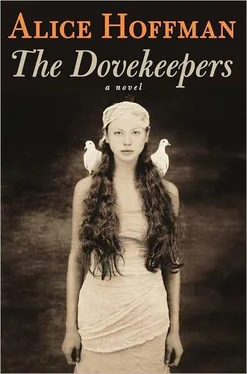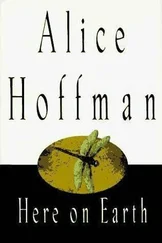Alice Hoffman - The Dovekeepers
Здесь есть возможность читать онлайн «Alice Hoffman - The Dovekeepers» весь текст электронной книги совершенно бесплатно (целиком полную версию без сокращений). В некоторых случаях можно слушать аудио, скачать через торрент в формате fb2 и присутствует краткое содержание. Год выпуска: 2011, ISBN: 2011, Жанр: Историческая проза, на английском языке. Описание произведения, (предисловие) а так же отзывы посетителей доступны на портале библиотеки ЛибКат.
- Название:The Dovekeepers
- Автор:
- Жанр:
- Год:2011
- ISBN:978-1-4516-1749-8
- Рейтинг книги:2.5 / 5. Голосов: 2
-
Избранное:Добавить в избранное
- Отзывы:
-
Ваша оценка:
- 60
- 1
- 2
- 3
- 4
- 5
The Dovekeepers: краткое содержание, описание и аннотация
Предлагаем к чтению аннотацию, описание, краткое содержание или предисловие (зависит от того, что написал сам автор книги «The Dovekeepers»). Если вы не нашли необходимую информацию о книге — напишите в комментариях, мы постараемся отыскать её.
The Dovekeepers — читать онлайн бесплатно полную книгу (весь текст) целиком
Ниже представлен текст книги, разбитый по страницам. Система сохранения места последней прочитанной страницы, позволяет с удобством читать онлайн бесплатно книгу «The Dovekeepers», без необходимости каждый раз заново искать на чём Вы остановились. Поставьте закладку, и сможете в любой момент перейти на страницу, на которой закончили чтение.
Интервал:
Закладка:
I took my father’s cloak. The others followed, and we moved together as if we had formed a cloud, a mist, nothing human. Quickly, we made our way through the orchard where there had once been almond trees, where pink flowers had floated in the air when the kadim wind arose. Nothing remained here, not a branch, not a bough, although the ground was littered with sparks that glowed with the incandescence of white moths that had been set before us, fallen to the earth.
More than mere trees had been felled in this now barren orchard, with blood flowing rather than sap, and strands of hair rather than flowers. Corpse after corpse littered the field.
Revka told her grandsons and Yehuda to think of the dark shapes on the ground as fallen trees, not as men and women and children with their throats slit. The deeds of the death-givers were nearly completed; soon they would set upon one another, for they had stood beside the Water Gate and drawn lots to see who would be the last warrior, the man to take all of his brothers’ sins upon himself and finish the other nine before turning the sword on himself.
Yet there were still some among our people to be dispatched, and the violence was not completed. We saw a family with four children waiting on the steps of a burning storeroom, silent as ghosts, though they were still in the world of the living, bleary-eyed and trembling. The father of the family was the first to offer his throat to one of the death-givers, as if to teach his children, as he might instruct them on how to gather sheep, or shoot an arrow, or begin their morning prayers with the rising of the sun. But this was not a lesson of beauty or knowledge, only an ugly moment of horror. The children swarmed around their dying father, grasping at his cloak as though by doing so they could retrieve his spirit from the World-to-Come.
The death-giver was Uri, the warrior who had come for my father and me in the desert, the boy who had been my brother’s friend, a mild young man who had been so awed by this fortress as he described it to me in the greatest detail while we sat around a fire in the wilderness, eating a meal I had procured, a bird I had called to me.
He had told me of the frescoes of the seven sisters painted by the finest artists from Rome, the baths that were heated by ceramic pipes, the gardens that clung to the cliffs, the palace that faced north so that anyone who resided there would always be gazing toward Jerusalem. We had sat together in the desert in the dwindling light, the scent of the myrtle around us, watching the fire as though observing a fate we didn’t yet understand. We were young, and the desert loomed with its unearthly beauty, the stars glittering above us in such great number we grew dizzy with their light.
Now the stars were hidden by the rising billows of smoke. Uri murmured the prayer for the dead for the man he had killed. The slain man had been one of the bakers in our marketplace. Revka hesitated when she saw the white apron beneath his prayer shawl as it turned scarlet. It was as though a flag of despair had been waved at her. I grabbed her arm and forced her to follow me, as I followed the doves who were fleeing from the only home they had ever known. Already the baker’s children on the stairs were being dispatched by Uri’s knife; they had gathered together to oblige their slayer, for there was nowhere for them to run.
Perhaps Revka uttered a groan as she turned from that scene of death, perhaps one of the boys stepped upon a stone or Shirah’s daughter, who had been named for a dove, whimpered and cooed inside my cloak. I hushed her as I hurried the others along, but it was too late. The echo of noise caused Uri to spy us through the dark. He finished his business on the steps in haste — they were only young children, and once they were gone, their mother gave no fight but flung her cloak open so that she might be taken from this life.
Uri came after us, spurred on by his duty. We ran, urging each other on, the boys darting out in front. Our breath was hot, and we all gasped as we ran for our lives. Noah and Levi stopped when they realized their grandmother was no longer among us. Revka had fallen back, unable to keep up. She shouted for us to run on, insisting that we forsake her though Uri was upon her, already restraining her, pleading with her to accept what must be as she fought him off. I wondered if she had stumbled on purpose, to keep the young warrior from gaining on us.
I told the boys to go forward and handed the babies over to Yehuda before running back to Revka.
“Go on,” she shouted, waving her arms the way she might have if I were one of the doves who refused to leave the nest.
She hadn’t thought much of me when I had first come to the dovecote, and she’d been right to be suspicious of me. I hadn’t been anyone worthwhile. A thief who hadn’t known what love meant, a fool with no understanding of what a lion could do if you lay down beside him.
I’d been a girl from the desert willing to do anything to survive.
I ran up behind Uri as he held Revka in his grasp. I rushed at him so that I might come at him with more strength, but also so I would not have to see his face. I had the knife that had belonged to Ben Simon, the one he had used on behalf of Zion, given to me to protect myself when he knew that he would die, and that we had sinned, and that I must go on without him.
I used the dagger before I could consider the weight of my deed, before I could feel the heat of Uri’s blood. When I had trapped the doves in the desert, their deaths had seemed like drifts of white smoke, swift and silent. This was an inferno, an explosion of blood and heat. Uri released Revka and turned to me, stunned, his gaze fixed upon me, as if I were the murderess and he the bird in the net. He moved to grab me and take me down with him, but before he could grasp me, he was struck from behind and he stumbled, lurching forward. He seemed a pale sheaf taken from the furrows of the earth, cut down in harvesting. He fell to the ground like the almond trees in the orchard.
The Man from the Valley had come upon us. He was nearly unrecognizable, his countenance resembling a beast as much as a man. That was why the Almighty had given us prayer, to distinguish men from animals, to leave the beasts inside of us locked away, as demons are locked in lead jars. This warrior wore nothing but his metal bands of agony and a tunic that was sodden with blood.
But no matter his appearance, the Man from the Valley was indeed human, though he himself might deny it. When Uri reached for me again, grasping at my leg, the Man from the Valley shouted at me to dodge backward. He made a quick sweep to complete Uri’s death, so swift it seemed his ax was made of light. Perhaps Gabriel, who was the lord of fire and of vengeance, did indeed walk beside him.
After the Man from the Valley had slain the younger warrior, he knelt to sing our song for the dead, which many said was the only prayer he would offer up to God. He chanted, in a trance. When he rose, I saw that he had been marked with the letters of the Almighty’s name across his chest and arms, for he was the last of the ten, the one who must slay all of the death-givers and then bring upon his own death.
Once he had been a learned man and a scholar, he had been a man of faith. He had partaken of a lottery to see who would be the last man, and God had chosen him for this terrible last task. Of all the death-givers, he was the most fierce, for his rising indignation over the condition of his kind had left him without fear. He was inured to violence; whether it was inflicted upon himself or upon another made no difference to him now.
Читать дальшеИнтервал:
Закладка:
Похожие книги на «The Dovekeepers»
Представляем Вашему вниманию похожие книги на «The Dovekeepers» списком для выбора. Мы отобрали схожую по названию и смыслу литературу в надежде предоставить читателям больше вариантов отыскать новые, интересные, ещё непрочитанные произведения.
Обсуждение, отзывы о книге «The Dovekeepers» и просто собственные мнения читателей. Оставьте ваши комментарии, напишите, что Вы думаете о произведении, его смысле или главных героях. Укажите что конкретно понравилось, а что нет, и почему Вы так считаете.












